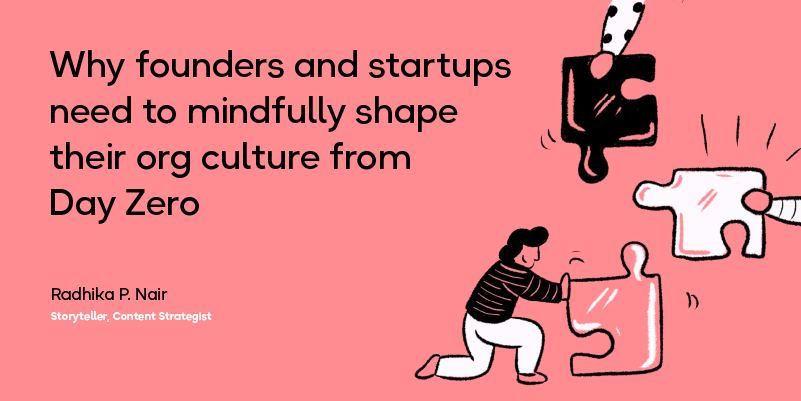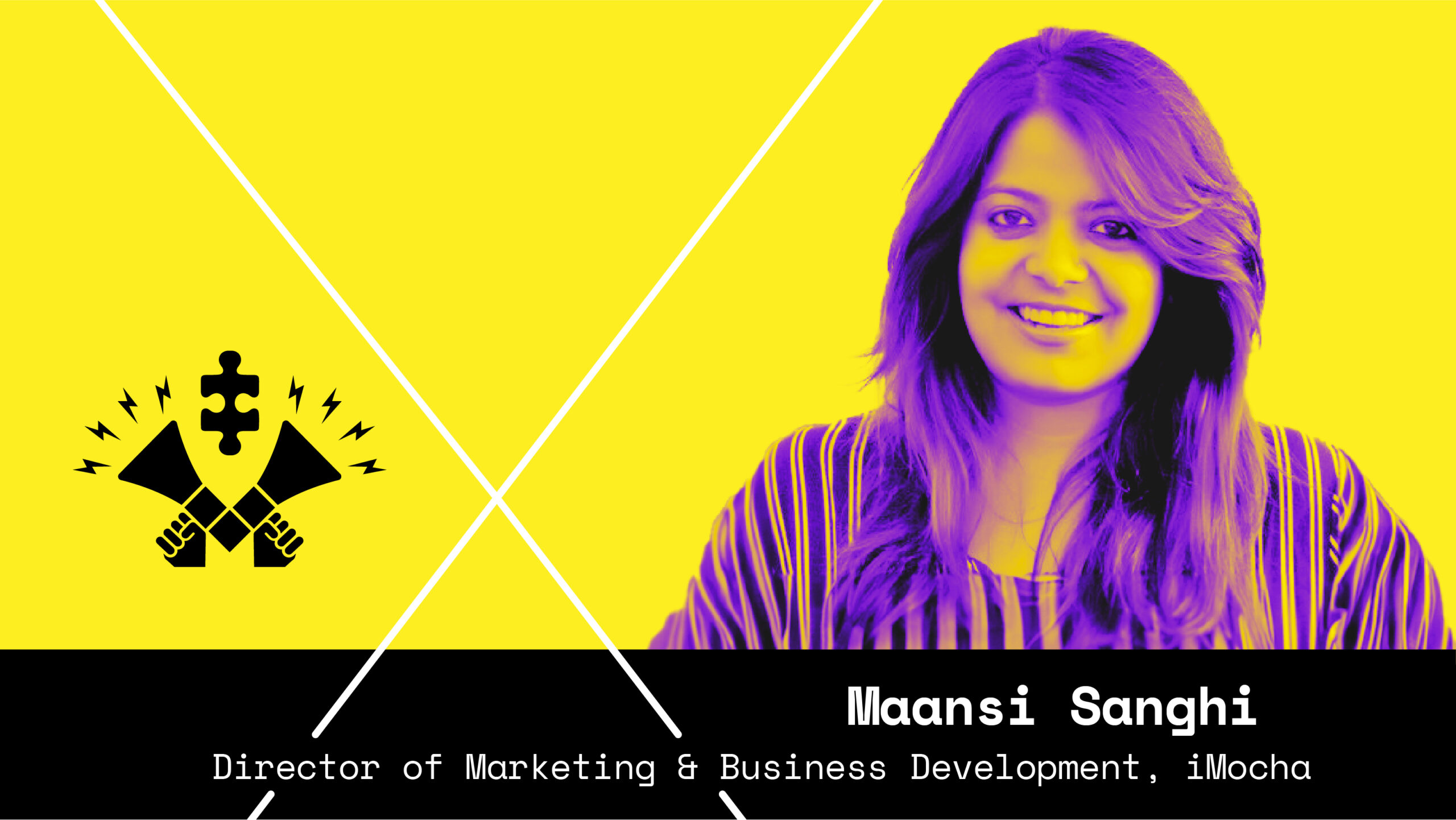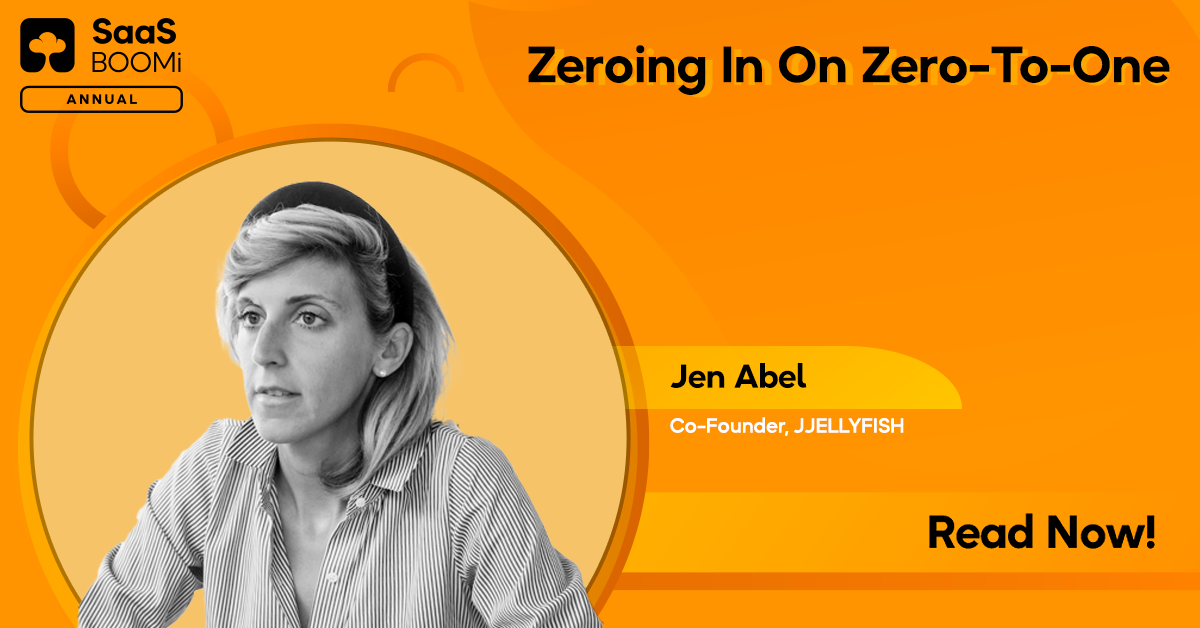A group of people working together to assemble office furniture—a simple enough task, but when the group is the newly-forged team of a newly-launched startup, something as simple as putting together furniture gets infused with profound meaning. In fact, it can be the freshly sowed seeds of organisational culture—getting things done and not waiting around for others to do the task. As this ‘first principle’ gets reinforced over time in the seemingly small acts and decisions taken by founders, team leaders and others, it becomes a part of the company DNA, a part of how things are done here.
When every action, decision, and choice that a founder takes right from the beginning of a startup’s journey directly or indirectly shapes the organisational culture, how can founders mindfully build it? Is that at all possible and is it important? That’s what I attempt to decipher here.
The assembling-office-furniture anecdote is a real-life example that Anand Jain, Co-founder of SaaS-based customer lifecycle management and mobile marketing company CleverTap, shared with me. “In the early days we operated out of a two-bhk in Mumbai. When we ordered furniture, the furniture company slotted the assembly a week after delivery. But we, the early team members, wanted to do it then and so we assembled it all, tables, chairs and bookcases, ourselves. We loved it. We did it together. We had a sense of accomplishment. We didn’t wait around,” Anand recalled.

Anand Jain, Co-founder at CleverTap
This inclination to taking ownership and getting things done has remained with CleverTap even as it has scaled. Today, ‘be urgent and take initiative’ is one of the six values that CleverTap expects its team members to live by.
What this example clearly illustrates is that a company’s values and culture get formed right from the start.
Culture = Performance
Every founder and HR head I speak to regarding culture agrees that an organisation’s culture has a direct impact on growth and business deliverables.
“At the end of the day, culture is all about how we work together. It has a very direct impact on performance. Culture is not just about how you treat people. It manifests itself in how you behave as a company. If you truly want to be a world-class company, culture needs to drive this,” says Suman Gopalan, Chief HR Officer at SaaS Unicorn Freshworks.

Suman Gopalan, Chief HR Officer at Freshworks
Most importantly an organisation’s culture sets the tone and pace of how employees there work together. We define certain companies as ‘aggressive’, others as ‘people-focused, and still others as ‘hierarchy-driven’. These descriptors are derived from the working style of an organisation, which is nothing but its culture. But, why has organisational culture become such an important talking point for founders and HR functions now? Just think of how companies have changed and transformed over the years. In an earlier era and in more traditional industries, hierarchy, top-down decision making, and following set processes were valued. That’s not the case today.
Tech companies thrive on innovation, on creatively using technology to solve challenges in ways that have not been done before.
For that to happen the organisation of today needs to be very different from the models of the past. We have seen tech majors globally, like Apple and Google, making their ‘new style of working’ an important part of business strategy. A lot of this new style was a matter of happenstance and experimentation.
Culture was considered as something that evolved organically over a few years, with the ‘pathways’ the founders, leaders and employees of a startup used most commonly to interact, to collaborate and to get work done becoming the only trodden ‘roads’. But, in recent years founders are flipping this. They are as mindful about culture as they are about product right from the start.
Amit Mishra, Founder and CEO of skills assessment platform iMocha, in fact says culture is what is “most important”. He says if the right culture isn’t internalised “culture will eat strategy for breakfast, lunch, and dinner.”

Amit Mishra, Co-founder & CEO of iMocha
There is a universality to the most desired features in today’s product-tech companies. Openness, transparency, ownership, readily voicing opinions and ideas, working with full commitment towards common goals even in situations of disagreements, aggressiveness in terms of results, humility in interpersonal interactions—these are some of the oft-repeated values or principles, with minor variations, that we hear. The hope is that such a culture fosters innovation. But, how do companies ensure all employees imbibe these values?
While each startup and founder has their own ‘methods’, I realised during my conversations with founders and HR professionals that a few common points stood out.
It all starts with the founder. A startup’s culture is a reflection of the founder’s personality. In the early days when the founder is the source code of everything to do with a startup, it isn’t surprising that the organisation almost becomes an extension of the founder(s).
“In the early stage, a company takes on the characteristics of the founders. If founders are slightly acerbic then the company culture becomes like that. As the leadership team evolves, so does the culture with the working styles of the new leaders also becoming a part of the culture,” says Niraj of Hiver.

Niraj Ranjan Rout, Founder & CEO at Hiver
Founders need to pay close attention to the values and principles they are projecting right from the early days. Further, founders need to consider the new working styles senior hires bring to the table. What works for the startup needs to be soaked up and what is detrimental needs to be cut down before it takes root.
Even after a company scales and moves from the early-stage to growth stage and beyond, the behaviour of the Founder or CEO remains critical. “Culture starts with the Founder/CEO, because ultimately how you shape culture is how you shape behaviour. People look up to the leader and he or she is the biggest ambassador of culture. They have to live it and founders have to be mindful of it,” says Suman of Freshworks.
Define your values and principles
In the early days, as founders focus on product, market, customers, sales and strategy, culture gets put on the backburner. Or the thought is that the team will understand what behaviour is prized and what isn’t. But, between the focus on scale and rapid growth and the minutiae of daily micro-decisions, the values and first principles get forgotten or ignored, especially when they have never been articulated.
If a new senior hire has a very different style of working from the norm, how do you decide whether it ‘fits’? To get this understanding—what works and what doesn’t—it is necessary for the founders to have a clear idea of what culture they definitely want to encourage.
“In about 18 to 24 months our team grew from around 15 people to 100. It was at this stage, when we were going through team expansion, that we sat down and clearly defined what our culture stood for. We had this conversation on how conflict needs to be handled, how feedback should be given, especially how positivity needs to be used while providing feedback and other such points. These conversations are important,” says Niraj.
Hiver has a clear set of values it lives by, but does not really have a document listing this out. Others like Freshworks and CleverTap have a set of values that are documented and reinforced in multiple ways, from being put on office walls to being part of training programmes. Whichever method you choose, saying out loud the principles on which the startup will be built is absolutely necessary.
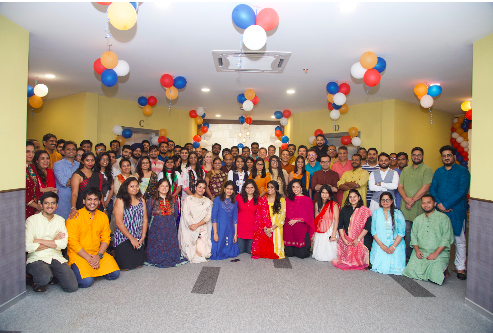
The CleverTap team in the days before pandemic-led work-from-home
To a certain extent, the company’s values or principles are a codification of the founder’s personality or what he/she prioritises. When founders cannot be part of every discussion or be in every meeting room, the values should stand in their stead and inform the employees on what is the right thing to do or the right way to achieve a task.
Culture is part of business
Culture is not about what employees do when they are not working. At the risk of repetition, it is about how employees get work done. It is in the day-to-day interactions and communication, it is in how decisions are made and communicated, it is in how a team member is hired or even let go, and it is in how critical feedback is provided.
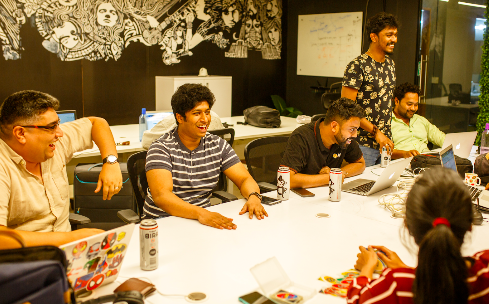
A meeting in progress at the Hiver office, in pre-Covid days
Values or principles are not really about morals or even ethics. While they may be derived from ethics or morals, an organisation’s values and principles need to be linked to business. The values should be able to act as guides when an employee needs to make a business decision or a choice.
For instance, one of the six values CleverTap extols is ‘be humble and seek to learn’. On its own, it may seem removed from business. But, the intent is to ground decision making and communication in humility. This helps minimise conflict. “We have been growing very fast and we are very aggressive in terms of growth and targets. But we are very humble in our day-to-day interactions. The message from the co-founders is clear, it is fine to be demanding performance, but no one has the right to not be humble,” says Prashant Parashar, Chief Human Resources Officer at CleverTap.

Prashant Parashar, Chief Human Resources Officer at CleverTap
It is particularly important, from the product-tech startup perspective, to link values to fostering product thinking and innovation.
For instance, at Hiver, transparency is an important value. Niraj explains that it is expected that any employee should be able to explain why they took a specific decision. If a colleague had made a feature request on Slack and if that feature has not been included, then the Product head is expected to give clear reasoning on why that decision was taken. “When everyone is accountable, it leads to positivity and productivity. There is a visible and direct impact on the product, as what to build and what not to build is well thought out because we are all answerable,” says Niraj.
Culture needs constant tending
Putting up the stated values on the walls of the office is not enough. “Culture is not inherited, it is learnt. You consciously build and create culture. People come from different backgrounds, so what you consciously do, communicate and practise daily that is what becomes your culture,” says CleverTap’s Prashant. Anand adds that culture needs to be reinforced. The point is culture is almost invisible—culture is acted out and sometimes it is in the little things. Like, taking a team member aside to give negative sounding feedback in private and offering guidance and mentorship so they improve.
Aakanksha Gaur, Senior Manager-People at Wingify whose flagship product is used to optimise digital customer experience, says that culture has a short-term memory. “Culture has to be supported by rituals. Culture is an emergent set of behaviours that arise out of people with a shared set of beliefs that are strengthened over time by repetition (rituals),” says Aakanksha, who is on a sabbatical right now.

Snapshot from the Wingify team outing to Phuket in Thailand in 2019
She explains how people are at the heart of Wingify and this is reflected in the company’s decisions. For instance, the company took the initial team of less than 10 people to an all-expenses-paid year-end trip to Goa. This ritual continued in 2019 even when the team grew to 200. Similarly, the company was among the first in the country to announce WFH when the first cases of Covid-19 were reported in the country in early-2020. It also announced a specific Covid-linked leave policy and an allowance to set up a work-from-home space. In fact, Wingify has also declared its intention to remain a remote-first organisation even after the pandemic.
This need to keep reinforcing values is repeated by others. iMocha’s Amit shares that the company makes a conscious effort to ensure their culture of ‘work happy’ is being practised. “We have a fortnightly culture meeting named ‘mocha forum’ to discuss this openly and transparently…It (work happy) is a conscious choice. I strongly believe at iMocha, professional journey and destination both should be enjoyable, rewarding, and celebrative,” says Amit.
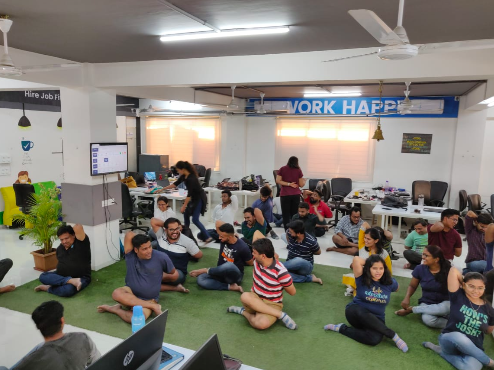
iMocha employees taking part in Yoga Day
Culture needs to be selective
When negative behaviours or character traits go hand in hand with bad performance the founders do not face any doubts on what to do. But what happens when a high performer who is getting results, at least in the short term, is exhibiting behaviours that do not fit the values of the company? This is one of the biggest challenges a founder will face—how does a startup deal with ‘brilliant jerks’. The consensus, unsurprisingly, is that it is best to nip such behaviour in the bud. When such behaviours are tolerated or ignored, it causes friction in the short term and negative impact on business in the long term. What’s worse is this undesired behaviour can become part of the company culture if left unchecked. However, we have seen numerous instances of such individuals getting tolerated and even celebrated in many companies, which goes to show how tough a decision it is to rein in such behaviour.
“I have learnt the hard way that cultural fit is more important than short term results. In the industry, brilliant jerks may bring results but they rub people the wrong way. When such behaviour is tolerated, it shows that culture is not as important for the company as is being said. That sends the wrong message. Culture is sacrosanct. I would let those guys go quickly. You are doing a disservice to your company by letting things slip or tolerating behaviour that does not meet your values. From a business perspective, it is important that the stars be team players,” says Anand of CleverTap.
In the final analysis, culture should be as important as a business strategy right from the start. As Suman of Freshworks says, “Don’t let culture happen to you. It is not an aspirational poster. It is your DNA; it is how you work together and it manifests as behaviours and norms. Just like DNA is a part of you when you are born, culture starts from day zero.”


